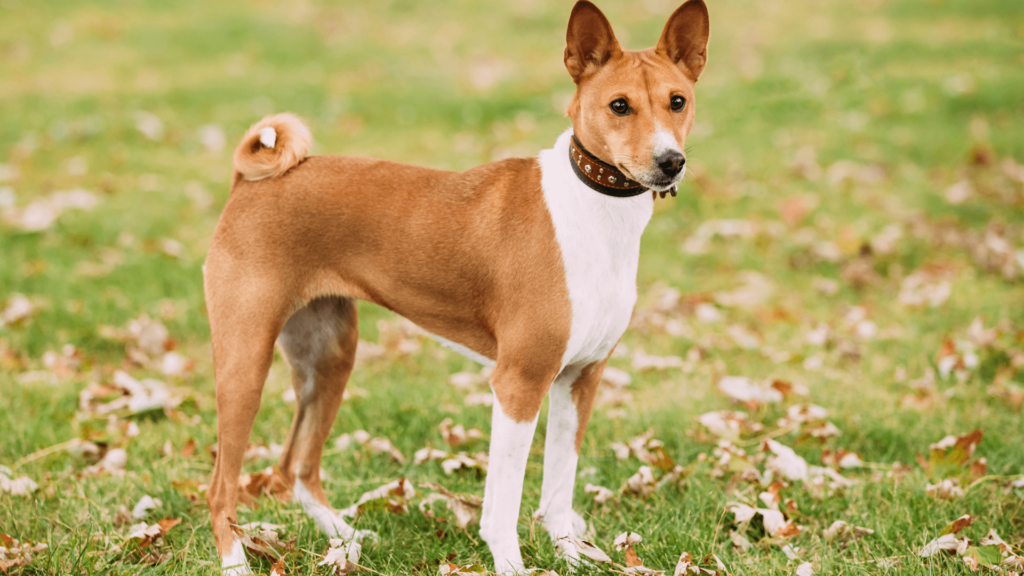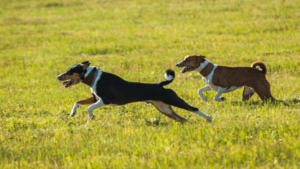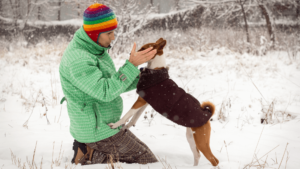Discover the Unique and Intelligent Basenji Dog Breed: A Guide to Basenji Characteristics Temperament and Care

What is a Basenji?
- What is a Basenji?
- History and Origin of the Basenji Breed
- Physical Characteristics of the Basenji
- Temperament and Intelligence of the Basenji
- Training and Exercise Requirements for the Basenji
- Health Considerations for the Basenji
- Grooming Needs for the Basenji
- What to Consider Before Adopting a Basenji
Captivating the hearts of many dog lovers, the Basenji is a unique and remarkable breed. This small to medium-sized pup boasts an elegant and graceful physique, with a curly tail, pointed ears, and a short coat that ranges in many colors. Not only is it known for its beauty, but it is also referred to as the barkless dog due to its unique vocalization that sounds more like a howl or yodel than a typical bark.
Basenjis are full of intelligence, independence, and curiosity. They have a high prey drive, making them natural hunters, so it is best to keep them away from small animals such as cats or rabbits. With proper socialization and training, though, Basenjis make wonderful companions and family pets. Despite their aloofness to strangers, they are incredibly loyal and loving to their owners.
In comparison to other breeds, Basenjis require relatively low maintenance. Their short coat doesn't need much grooming, and they are healthy with few genetic health issues. Despite their low-maintenance needs, they are full of energy and need regular exercise - such as daily walks, playtime, and interactive toys - to remain mentally and physically stimulated.
To prevent boredom and destructive behaviors, providing them with mental challenges like puzzle toys and training sessions is also important.
All in all, the Basenji is an extraordinary breed that can offer a unique and fulfilling companionship experience. It is essential to understand their characteristics, temperament, and care needs to ensure they live a happy and content life. Therefore, before adding a Basenji to your family, make sure to learn more about this alluring breed and see if they are the ideal match for you.
History and Origin of the Basenji Breed
The Basenji's past is an intriguing journey through time, having been prized by Pharaohs and nobility in ancient Egypt. Intertwined with the Pygmy tribes of Africa, these clever and resourceful canines were employed for hunting and navigating through dense jungle areas. Throughout the centuries, the Basenji breed has demonstrated its resilience and versatility in various environments.
While the precise origin of the Basenji is still a mystery, it is believed to be one of the oldest dog breeds in existence, with roots that date back thousands of years. Others think these four-legged companions were brought to the continent by traders and explorers. Regardless, the breed quickly gained recognition and admiration all over the world due to its exotic appearance and distinctive vocalizations.
In the early 20th century, the Basenji made its way to Europe thanks to British hunters. This sparked an international fascination with the breed, and it has since been acknowledged and cherished in many countries. To protect its unique characteristics, breeders have carefully selected and bred the Basenji, ensuring its genetic heritage is safeguarded for future generations.
The Basenji's history highlights the value of preserving the heritage of our canine friends and celebrating the diversity of dog breeds. This breed is even today celebrated for its natural hunting aptitude, intelligence, and independence - attributes that can be further developed through dog training.
Physical Characteristics of the Basenji
The Basenji stands out from other breeds with its unique physical characteristics. Compact and muscular, these dogs possess an elegant, sleek physique that weighs in at around 22-24 pounds. Their alert expression is created by their prominent, erect ears, while their almond-shaped eyes are dark and intelligent.
Basenji's coat is short and fine and comes in a variety of colors, including red, black, and brindle. To keep their coat looking its best, regular brushing is recommended.

The Basenji's vocalizations are another distinguishing feature. Instead of barking, these dogs produce a captivating yodel, which has become synonymous with the breed. Their keen sense of smell is yet another trait, with a highly sensitive nose that should stay unobstructed.
In addition to these characteristics, the Basenji's tightly curled tail, held over their back, adds to their appeal. They are also nimble, agile creatures, thanks to their athletic build and powerful muscles, making them ideal for various canine sports and activities.
Overall, the Basenji stands out from other breeds with its distinctive physical characteristics. From its coat to its vocalizations, this breed should be kept clean and groomed regularly to ensure its health and beauty. Their alert and curious nature, combined with their athletic prowess, make them an excellent companion and an ideal canine athlete.
Temperament and Intelligence of the Basenji
An intriguing combination of loyalty, independence, and affection, Basenjis are a truly unique breed. Possessing a cat-like nature and an independent streak, these intelligent canines are highly observant and keep an eye on their surroundings.
Their curiosity makes them quick learners, but their stubbornness can sometimes impede training. Nevertheless, Basenjis are incredibly loyal and affectionate to their families and thrive on human companionship.
To ensure their well-being, they require mental activities such as puzzle toys or obedience training. Generally, Basenjis are not aggressive and can be good with kids and other pets when properly socialized. Moreover, their alertness and vigilance make them excellent watchdogs.
In addition to physical exercise, Basenjis need to be mentally stimulated to prevent boredom and destructive behavior. They are highly trainable and can even be used as therapy or emotional support animals due to their sensitivity to their owners' emotions.
Furthermore, they can excel in various dog sports such as agility or scent work. Overall, providing them with the necessary mental activities can bring out their best qualities and make them a wonderful companion.
Basenjis can be quite aloof with strangers, but their strong bond with their owners is unrivaled. Despite their independent nature, they are affectionate and love to be around their family. To maintain this relationship, they need to be given plenty of attention and affection.
Their intelligence means that they can quickly pick up on cues and signals, which makes training them easier. With the right training and socialization, Basenjis can be an excellent addition to any family.
Overall, the Basenji is a truly unique breed with an intriguing blend of temperament and intelligence. They are independent, yet loyal; curious, yet alert. With the right training and socialization, they can be an amazing companion and bring a lot of joy to any home.
Training and Exercise Requirements for the Basenji
Training and exercise are indispensable for your Basenji's health and well-being. These intelligent canines need plenty of mental and physical stimulation to stay at their best, so it's essential to provide them with regular training sessions and ample opportunities to expend energy. Basenjis are known for their self-sufficient nature, so it's important to take the role of leader and employ positive reinforcement techniques to motivate them.
When it comes to exercise, your dog will benefit from daily walks, playtime in a securely enclosed area, and engaging activities that test their intelligence and agility. A trained and exercised Basenji is a content and orderly companion, so it's essential to ensure they receive the proper care.
Your Basenji's training should start early and be consistent. These sharp-witted dogs can learn quickly, but they can also be headstrong at times. Positive reinforcement techniques, such as treats and compliments, are most effective with this breed. Training sessions should be succinct and focused, with a variety of commands and tricks to keep your pup interested. Each dog is unique, so tailor your training methods to match your Basenji's character and learning style. With patience, uniformity, and positive reinforcement, you can teach your Basenji basic obedience commands and even advanced tricks.
In addition to training, regular exercise is a must for your Basenji's mental and physical health. These energetic dogs have a lot of energy to expend, so daily walks and play sessions are key. Basenjis also relish activities that challenge their intelligence, such as brainteaser toys or agility training. Offering them outlets for their energy and mental stimulation will help forestall destructive behaviors that may arise from boredom. Remember, a pooped Basenji is a compliant Basenji, so be sure to include lots of exercise in your daily routine.
Health Considerations for the Basenji
When bringing a Basenji into your home, health considerations are a key factor. Though they are generally healthy, this breed is vulnerable to certain issues. Anesthesia awareness is one such caution for Basenjis, as their unique physiology requires extra care during surgical procedures. It is important to discuss any potential concerns with your vet. Furthermore, the breed is prone to particular genetic disorders, such as Fanconi Syndrome, which affects the kidneys' ability to reabsorb essential nutrients.
Routine kidney monitoring is crucial for timely diagnosis and management. Additionally, Basenjis can suffer from eye problems, such as progressive retinal atrophy and glaucoma, thus regular check-ups with a veterinary ophthalmologist are recommended.

Allergies are another health consideration to keep in mind with Basenjis. They may be sensitive to environmental factors, including pollen, dust mites, and ingredients in food. Any indications of allergies, such as skin irritation, redness, or gastrointestinal issues, must be taken seriously and a vet should be consulted.
Additionally, their heightened prey drive means that Basenjis are likely to pursue small animals, potentially resulting in injuries. To minimize the risk of accidents, it's important to ensure your Basenji is in a safe, secure environment. Regular exercise and mental stimulation must also be provided to maintain their overall health. With understanding and awareness of these health considerations, you can ensure your Basenji is a happy and healthy family member.
Grooming Needs for the Basenji
Caring for a Basenji requires frequent grooming to maintain their short, fine coat. Brushing their coat with a soft-bristled brush or grooming mitt is essential to remove any loose hair and keep it looking its best. These canines are known for their cleanliness and self-grooming habits, so they only require minimal bathing. It is important to regularly inspect their ears for any signs of infection or wax buildup, as well as check their nails and paws for any cuts, abrasions, or foreign objects.
In addition, providing routine dental care such as regular teeth brushing and dental check-ups is key to preserving their oral health. All in all, Basenjis are one of the most low-maintenance dog breeds when it comes to grooming, making them an ideal choice for those who don't want to spend too much time on grooming.
What to Consider Before Adopting a Basenji
Before bringing a Basenji into your home, there are a few important things to consider. Firstly, it's critical to acquaint yourself with the breed's personality and temperament. These intelligent and independent canines possess a powerful prey drive and can be stubborn at times. To ensure a successful adoption, make sure your lifestyle and living space are suitable for the needs of a Basenji.
Furthermore, don't underestimate their exercise requirements. Basenjis are an energetic breed that requires regular physical and mental stimulation, so always be prepared to provide them with plenty of activities.
When it comes to training a Basenji, consistency is key. Due to their independent nature, these dogs can be difficult to train. Patience and positive reinforcement are two essential tools for successful Basenji training. Additionally, it's important to note that Basenjis are prone to vocalizations and are known to bark excessively. This is something to bear in mind, especially if you live in a close-knit community or an apartment building.
Finally, it's important to consider the grooming needs and health concerns of the Basenji breed. These dogs have a short coat that requires minimal grooming. However, they are known for their cleanliness and often groom themselves like cats. In terms of health, Basenjis are generally healthy and hardy.
Nevertheless, they are prone to certain conditions such as Fanconi syndrome and progressive retinal atrophy. To ensure the overall well-being of your Basenji, make sure to keep up with regular veterinary visits and provide them with a well-balanced diet.

Leave a Reply